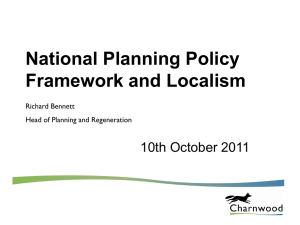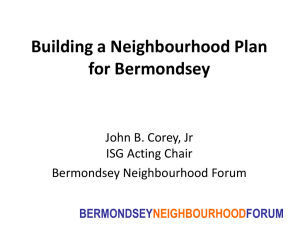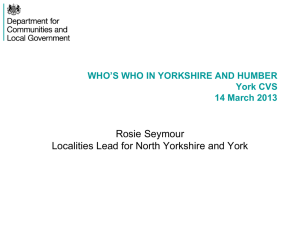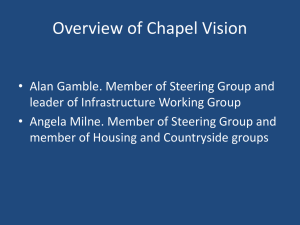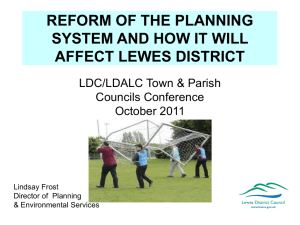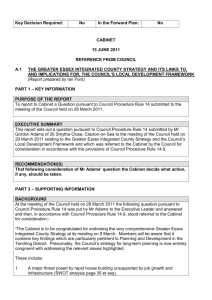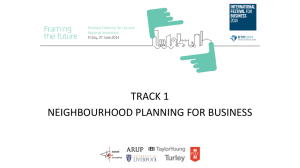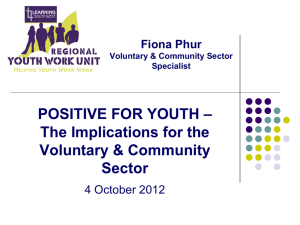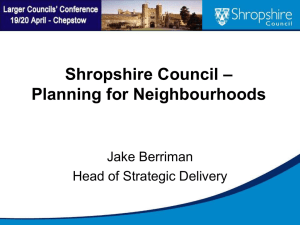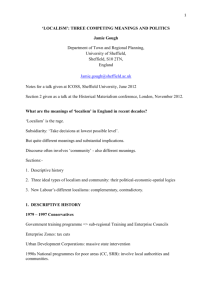Localism in London - London School of Economics and Political
advertisement
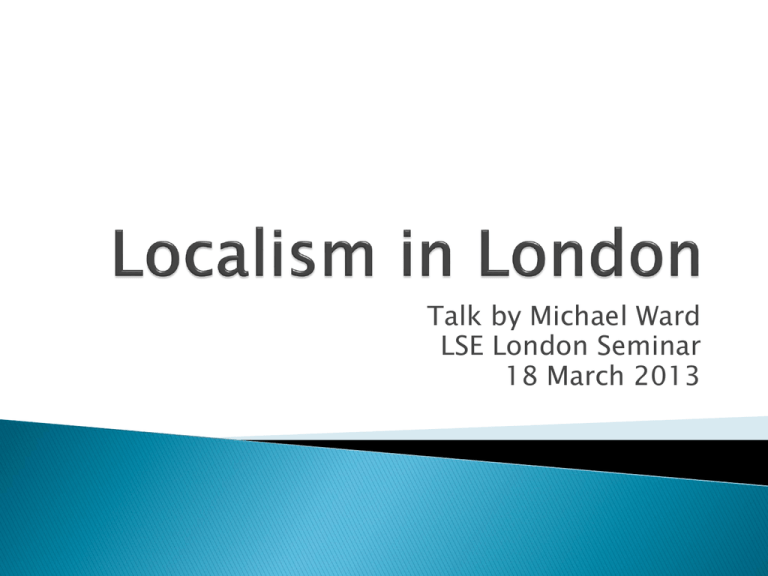
Talk by Michael Ward LSE London Seminar 18 March 2013 1889 1899 1935 1960 1963 1986 1990 2000 2011 Creation of London County Council Creation of Metropolitan Boroughs; Abolition of parish vestries in LCC area Last parish council in outer London abolished (North Ockendon) Herbert Commission Report London Government Act Creation of boroughs, GLC & ILEA Abolition of GLC Abolition of ILEA Creation of GLA and mayoralty Localism Act Localism= A body of ideas Legislation – the Localism Act 2011 …overlain by whimsy, nostalgia and romanticism.. “London became a greater and still greater accumulation of towns, an immense colony of dwellings where the people still live in their own houses in small communities, with local governments, just as they had done in the Middle Ages” (Rasmussen, London The Unique City, 1934) Herbert Commission – LSE Scheme B: ‘Met Counties’ with population of 1 – 1.5 million each + ‘urban parishes’ “with limited executive and certain advisory functions” “The urban parishes would represent neighbourhoods or communities in Greater London which have a real sense of communities and still have some of the characteristics of a village embedded in a town.” (Herbert Report, para 737) But not accepted…. London Boroughs- “London boroughs are too small for the big things (organising services that require scale economies to function effectively) and too big for the small things (people have a sense of connection to Neasden, Norwood or New Cross not to the London Borough that organises their refuse collection and collects their council tax). – (Borough Chief Executive) ‘Double Devolution’ – 2006 report by Mulgan & others – proposed “a 10-year programme to shift power downwards: from Whitehall and Westminster down to town halls, and from town halls to communities and citizens.” Empowerment White Paper – ‘Communities in Control’ – 2007: “We want to shift power, influence and responsibility away from existing centres of power into the hands of communities and individual citizens.” (Cm 7427 2007) Coalition Agreement 2010: “The Government believes that it is time for a fundamental shift of power from Westminster to people. We will promote decentralisation and democratic engagement, and we will end the era of top-down government by giving new powers to local councils, communities, neighbourhoods and individuals. We will promote the radical devolution of power and greater financial autonomy to local government and community groups. This will include a review of local government ˆ finance. “ “Labour should back localism because the time is right, it’s the way in which we can get the most out of the money we have, and because it will help to renew trust in politics.” (Hilary Benn, Shadow CLG Secretary, 7 March 2013) Localism the new conventional wisdom “It will be convenient to have a name for the ideas which are esteemed at any time for their acceptability, and it should be a term that emphasizes this predictability. I shall refer to these ideas henceforth as the conventional wisdom.” (JK Galbraith, The Affluent Society, 1958) London Government Transfer of LDA and London HCA to Mayor Mayor becomes Police Authority Power to set up Development Corporations Scope for further devolution from Whitehall London Boroughs General power of competence; “ a local authority has power to do anything that individuals generally may do”; Longstanding local government demand; But without resources… Limited use of previous ‘wellbeing’ power. Community rights: Community right to challenge Community right to bid for assets of community value Community right to build Neighbourhood Plans Neighbourhood plans can be drawn up by neighbourhood forums or parish councils Right to set up parish councils in London reestablished by the Local Government and Public Involvement in Health Act 2007; Can be called parish, neighbourhood, village or community councils; Government consulted in 2012 on simplifying procedure for setting up new parishes; Eric Pickles: parish councils are “localism’s magic wand”. 1 London parish so far approved by local referendum – Queen’s Park in Westminster; First Queen’s Park elections in 2014, at same time as Borough elections Other London parishes in pipeline: Bermondsey & Bankside (Southwark) London Fields (Hackney) Major strengthening of city government 1999 GLA Act judged a success by 2004 2007 GLA Act extended Mayoral powers over housing, planning, waste and skills From 1986 to 2000, London was the only English region without a strategic planning framework – now it is the only one with such a framework Limitations: - resources - executive capacity/delivery Issues: Yes, but is a strong city authority really localism within the meaning of the Act? Strong city government traditionally the argument of the left Could the Mayor/GLA settlement deliver the strategic authority the GLC was supposed to be? Neighbourhood plans: “will allow communities, both residents, employees and business, to come together through a local parish council or neighbourhood forum and say where they think new houses, businesses and shops should go – and what they should look like.” (CLG) Can be prepared by a forum or parish council; Will get some of CIL money But – must comply with borough and London Plan Considerable interest in London: Neighbourhood planning in London: area or forum designated: Brent Sudbury Town Camden Highgate Ealing Ealing Central West Ealing K&C Norland Sutton Hackbridge Plus 20 more applications for designation submitted Plus 32 more expressions of interest But: November 2012 – 50% of boroughs reported no interest Nationally - first Neighbourhood Plan approved by local referendum in Eden Valley, Cumbria, 7 March 2013 Examples: Dartmouth Park, Camden - at expression of interest stage - voted 88-1 in Feb 2013 to establish forum Stamford Hill, Hackney - 2 competing bids - “This approach would work in a country village, but here you have real divisions.” Too soon to judge? Clearly mobilizing great involvement Early days - no London Neighbourhood Plan yet approved Key ambiguity – designed to facilitate development? Or to prevent development? Limited resources available to forums; Little scope to protect communities from social and economic change; Little scope to address crisis in affordable housing. Rights to challenge, to bid, to build Little activity in London so far Community group in Nunhead, Southwark, succeeded in getting local pub listed as an ‘asset of community value’ Now trying to bid (but have to raise £750,000) Campaign groups in other boroughs trying to get assets listed Local authorities have often been remote, insensitive, bureaucratic… All change in London Government has been dominated by the remorseless logic of economies of scale; Vestries, parishes, Metropolitan Boroughs, Urban District Councils – all swept away; So empowerment, double devolution, parishes, neighbourhood planning, community rights are an overdue step in the other direction But These changes are not an answer to how you govern London; Localism is not the most interesting or important thing happening in London government The London agenda: Demographic change The world city narrative Strengthened city government Boroughs preoccupied with spending cuts Continued pressure for big ticket infrastructure (X Rail 1& 2; HS2; Thames Tideway Tunnel Sewer, etc.) Resources for London The slow death of local government finance Failure to act on Layfield De facto adoption of centralist option Long term movement of services (income support, health) to centre; Drift of tax base to London and South East Council tax capping Can you have real localism without a buoyant local government finance system? Risk of London solving its problems at the expense of the rest of England? Possibility of a set of services administered, but not funded, by local government. Thanks to the following, who provided information and comments, but are not responsible for any mistakes: Sue Brownill Michael Edwards Neil McInroy Max Nathan Barry Quirk Dick Sorabji David Walker
